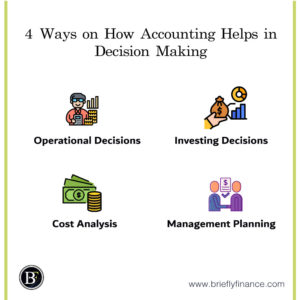Accounting is important because it allows companies to keep track of all of their financial transactions. It is the method through which businesses record and analyse the financial data that flows in and out of their operations. It allows both corporate executives and outside analysts to assess the firm’s sustainability and make informed decisions.
Accounting uses data from your operations to generate reports that give you and your managers continual insight into business performance, so you and your managers can make informed decisions.

Attribution: The icons has been designed using resources from Flaticon.com
4 Ways on How Accounting Helps in Decision Making
1. Making Effective Operational Decisions
It can be tough to decide if it is better to develop a new product or subcomponent yourself or employ a third-party production company to deliver the unit to you when you need one. Accounting can assist you in making a decision based on the cost-effectiveness of each choice.
Making the proper selection can not only save you money, but it can also rescue your entire company from financial challenges. Adjusting some of your manufacturing lines can sometimes be more cost-effective than purchasing a unit; nevertheless, there are situations when employing an external supplier is more cost-effective.
2. Provides Relevant Cost-analysis
Executive management can use accounting to measure and track performance and make real-time decisions. Measuring performance versus estimates and budgets helps a company stay competitive by avoiding costly overruns.
Accounting is used to conduct cost-benefit analyses for new initiatives and to generate ongoing reporting for ongoing projects. These initiatives may necessitate considerable cash and capital outlays as well as new debt to finance them. Accounting is essential for ensuring that these projects are completed on time and budget while being profitable.
3. Helps in Investing decisions
The accounting data reported on a company’s financial statements, such as the income statement, cash flows, and balance sheet, is critical to fundamental analysis.
Financial statement information is used by investors and analysts to make conclusions regarding a company’s valuation and creditworthiness. It allows you to set price targets and assess whether a stock’s price is reasonably valued or not. Investors would have less understanding of stock, bond issuers’ history, current, and future financial health if financial accounting information was not available.
4. Future Management Plans
To prepare for your company’s future, you must first understand its current state and track its financial tendencies. This way, you’ll be able to make long-term goals for your company based on accurate data.
If you want to grow your production capacity, management accounting can provide you with information about when is the best time to begin the process. Expansions cost money, time, and often necessitate pausing production for some time. Without the knowledge, you could easily make a poor selection and end up paying more for the expansion than you anticipated.
Final Thoughts
Accounting can be used to make short- and long-term choices about a company’s financial health. Accounting helps managers make strategic decisions by improving the company’s operational efficiency and long-term investment strategies. Monitoring, forecasting, and tracking performance is a crucial part of managerial accounting. It ensures that actual results match the budgets and forecasts outlined at the onset.
Related Posts:
